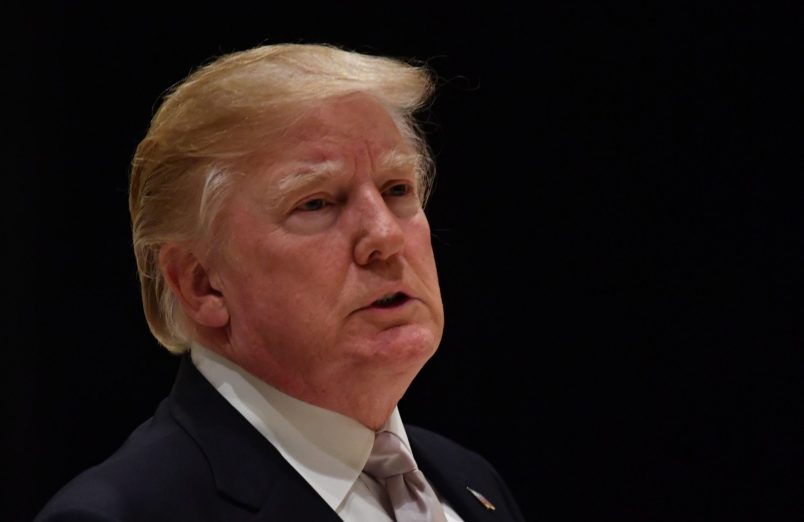For a year and half, President Donald Trump and his supporters have dismissed the growing evidence of Russian interference in the 2016 election as a hoax. But Special Counsel Robert Mueller’s indictment of 13 Russian nationals Friday suggests it’s all too real.
Trump has maintained that Democrats, pained by their surprise electoral loss, invented the notion that Russian operatives spread propaganda on social media and leaked emails stolen from top Democratic operatives. Pinpointing the bad actor behind the attacks was simply not possible, Trump insisted. He has said he believed Russian President Vladimir Putin’s denials that Russia played any role.
Trump was wrong, according to U.S. prosecutors. Mueller’s indictment lays out in precise detail how, prosecutors believe, Russia’s Internet Research Agency carried out a multi-year, multi-million-dollar project to impersonate U.S. citizens on social media, hold on-the-ground protests in states like Florida, and even further bogus claims that Democrats committed voter fraud. The 37-page document is backed up with dates, names, bank account numbers, and the text of specific ads that the Russians paid to promote.
It provides conclusive public evidence that Russians were behind the mass interference campaign in the 2016 election, as the U.S. intelligence community concluded back in their January 2017 report.
As both documents make clear, Russia’s intention was both to undermine trust in the U.S. political system and, at least from mid 2016 on, to get Trump into the Oval Office. The indictment also says Russia sought to help Trump in the Republican primary.
Trump was suspicious of this notion from the get-go. During the campaign, he alternately suggested that the Democratic National Committee’s servers were hacked by its own staff (June 2016), China or “somebody sitting on their bed that weighs 400 pounds” or nobody at all.
After Trump won the election, his official line was that federal and congressional investigations into Russia’s interference were based on “Fake News Media” stories, “sleazebag political operatives,” and a “phony Democrat excuse for losing the election.”
Trump continued to press for a closer relationship with Russia, even tweeting in July 2017 that he had spoken to Putin at the G20 Summit about “forming an impenetrable Cyber Security unit so that election hacking, [and] many other negative things, will be guarded and safe.”
The President quickly backed down in the face of widespread outrage. But he continued to tell the media he believed Putin was “sincere” when he told him in their face-to-face meetings that Russia did not intervene.
Proof of Russia’s social media influence campaigns surfaced by the House and Senate Intelligence Committees did not change his mind.
“The Russia hoax continues, now it’s ads on Facebook,” Trump tweeted in September 2017. “What about the totally biased and dishonest Media coverage in favor of Crooked Hillary?”
Mueller’s indictment notes that Internet Research Agency operatives began purchasing ads on social media sites to promote their bogus activist groups in 2015, spending thousands of U.S. dollars per month on the effort.
The ads were real. The fake social media accounts existed (and Trump himself even interacted with one of them). The DNC emails were hacked and leaked. And we now have hard evidence that Russia funded and orchestrated the whole elaborate effort.







Don’t count on it.
Trump will never concede that any of this happened.
It will get more interesting, of course, when Mueller starts zeroing in on the domestic enablers and cooperators. Establishing that the election interference took place is just step one. Next comes the effort to identify the co-conspirators.
Now Trump will jump from the “Political witch hunt, it never happened, Putin told me so!” approach to the “Oh look, it happened, but I’m innocent!” approach.
Which is EXACTLY what Mueller wants.
Identify the existence of the crime. Then identify the lies about the existence of the crime. Then identify the obstruction into the investigation of the crime.
THEN identify the conspiracy to partake in the crime.
… and eleventy billion others.
There is also a one-page “graphic novel” version that has been sent to the White House for … um … declassification, yes, that’s it, for declassification.